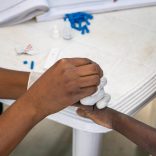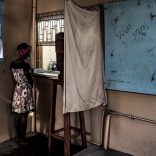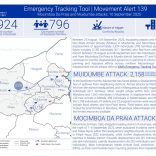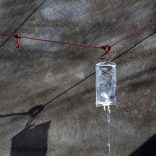Mozambique: NGO earmarks €3 million to support people living with HIV in Gaza province
Mozambique: Nationwide malaria vaccination campaign starts in Zambezia province

FILE - For illustration purposes only. [File photo: Lusa]
Mozambique is starting a malaria vaccination campaign in the country on Monday, starting in Zambézia province, in the centre of the country, with a target group of children aged 6 to 11 months, the ministry of health announced.
“The selection of Zambézia province as a pioneer is due to the high number of cases and deaths from malaria reported in children under the age of 5,” the ministry explained in a statement, adding that, given the “limited availability of the malaria vaccine on the market”, the introduction “will be carried out in phases”, starting in that province “in all health units in the 22 districts”.
“From next year, the vaccine will be expanded to other parts of the country, depending on the priorities and availability of the vaccine on the market,” it says.
The malaria vaccine adopted by Mozambique “is administered intramuscularly” and the target group is children aged between 6 and 11 months.
“At 6 months the first dose will be given, at 7 months the second dose, at 9 months the third dose and at 18 months the fourth dose,” explains the ministry of health.
For children who start vaccination after 6 months, the second and third doses of the malaria vaccine “will be given four weeks apart, and the fourth and final dose six months apart”.
The malaria vaccine will be administered with other vaccines in all Health Units and in the mobile health centres in accordance with Mozambique’s vaccination calendar.
“It is safe, effective and provides additional protection against malaria. Many countries have already introduced the malaria vaccine with satisfactory results, such as Malawi, Ghana, Kenya, Benin, Burundi, South Sudan, Uganda and Sierra Leone,” it added.
The Ministry of Health recalls that malaria continues to be “one of the biggest public health problems” in Mozambique “and one of the main causes of morbidity and mortality”.
Up until May 2024, the country registered 5,188,624 cases of malaria, “a decrease of 33%” compared to the same period in 2023, as well as 28,602 cases of severe malaria, down by 7% year-on-year.
“In-hospital deaths saw the same downward trend, with 172 deaths recorded in 2024 compared to 202 deaths in the same period in 2023, which represents a decrease of 28%,” the ministry continues.
“Like any other vaccine that is in circulation, after vaccination against malaria the child may have side effects such as fever, pain or swelling at the injection site, but it is a reaction that will pass in a short time. If a child is given the vaccine and shows serious signs or symptoms, they should go to a health centre,” the ministry emphasised, calling for other measures to prevent the disease to be maintained.
“The malaria vaccine has had an effect on reducing severe cases and deaths from malaria,” it recalls, adding that the vaccination campaign that starts today represents an investment, in the first phase, of US$381,229 ( €348,000), financed by the government and the Global Alliance for Vaccines and Immunisation (Gavi), among other partners.
The Mozambican authorities previously announced that R21/Matrix-M, the second malaria vaccine for children, developed by Oxford University in the UK and approved in October by the World Health Organisation (WHO), will be used in the country.
The vaccine to be used in Mozambique is the second recommended by the WHO, after RTS,S/AS01 in 2021, following the advice of the Strategic Advisory Group of Experts on Immunisation (SAGE) and the Malaria Policy Advisory Group (MPAG).












Leave a Reply
Be the First to Comment!
You must be logged in to post a comment.
You must be logged in to post a comment.